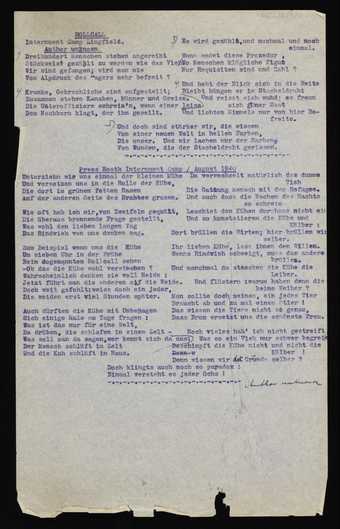ŌĆō Tate and ZooniverseŌĆÖs crowdsourced transcription project ŌĆō has now been live for five months, and during this time over 10,000 participants have worked to transcribe more than 20,000 documents. The materials being transcribed are items containing text from artistsŌĆÖ archives in ░š▓╣│┘▒ŌĆÖs collection, which range from annotated sketches, observations, letters and poetry, to correspondence and administrative documents. Many of the AnnoTate participants share details of their transcription travails on the forum, posting the source documents and commenting on the pleasures, problems, and peculiarities encountered whilst undertaking the tasks at╠²hand.
The project has proved fascinating in all its complexity, and has covered much new ground in the emergent field of crowdsourced contextual transcription. Indeed the difficulties encountered in the transcription process are as enlightening as the successes. For example, a number of transcribers have encountered when just one hard-to-read word on a page obscures the broader meaning of a document, confusing entire sentences ŌĆō or worse, passages. This can be caused by a number of things; semantic drift for example, which describes the process of words changing their meaning over time. Often itŌĆÖs do with context ŌĆō knowing an or their circleŌĆÖs private slang can prove useful! Other times itŌĆÖs a matter of cursive script - whether neatly or messily rendered ŌĆō proving tricky to╠²decipher.
However these instances allow Talk to come in to its own, with other community members sharing knowledge to support their peers, which╠²consequentially encourages further engagement with art and artists, related histories, language, philosophy, and much more beyond. It has been a pleasure to have been involved in the Talk community, who since AnnoTate launched, have highlighted the delights and depths of the archive collections in new and inspiring╠²ways.
First English translation of a Klaus E Hinrichsen╠²poem
One such moment came after a initiated by transcriber Barbara Jung resulted in the voluntary translation of a poem found in Klaus E HinrichsenŌĆÖs archive. Unattributed and written in German, to our knowledge, this is the first time the verses have appeared in English. The poem thoughtfully explores the abject absurdity of the internment of detainees during World War Two. Hinrichsen himself had fled to Britain during the 1930s to escape Nazi persecution. While interned in Hutchinson camp on the Isle of Man during the early 1940s, he befriended other German and Austrian scientists, musicians and artists ŌĆō most notably Erich Kahn and the dadaist Kurt Schwitters ŌĆō and helped to establish what became known as the ŌĆśHutchinson UniversityŌĆÖ, where internees could while away the hours behind barbed wire in a creative spirit. The translated poem can be read╠²below:
░š│¾▒╠²│”░∙┤ŪĘ╔╗Õ▓§┤Ū│▄░∙│”▒╗Õ╠²will run until 2017, and anyone is free to join in during this time. New users can learn how to transcribe using the tutorial offered on AnnoTate, or for more information refer to╠²░š▓╣│┘▒ŌĆÖs introductory blog.
There is much to explore in ░š▓╣│┘▒ŌĆÖs Archives, and AnnoTate offers just one means of entry. AnnoTate is╠²an outcome of the Archives & Access project,╠²which has╠²seen 52,000 objects from╠²░š▓╣│┘▒ŌĆÖs Archive╠²digitised and made available online.╠²A suite of╠²digital tools╠²▓╣▓į╗Õ╠²resources╠²(such as╠²the Animating the Archives video series, which╠²examines some of the stories behind ░š▓╣│┘▒ŌĆÖs archives of British art, including Klaus E. Hinrichsen and the artist Kurt Schwitters)╠²have also been created, and╠²a national╠²Learning and Outreach initiatives have been facilitated. Read more about╠²Archives & Access here.╠²╠²


![a written letter from Bear [Duncan Grant] to Vanessa Bell](https://media.tate.org.uk/aztate-prd-ew-dg-wgtail-st1-ctr-data/images/1_3.width-340.jpg)